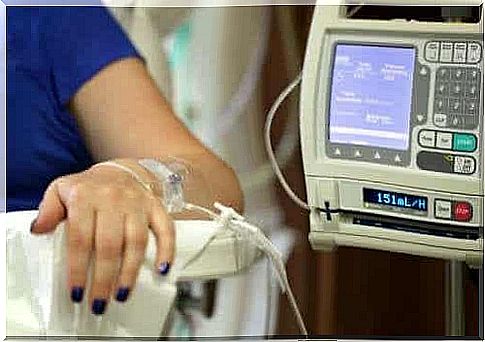Anti-emetic Drugs To Prevent Nausea

Today there are drugs, known as antiemetic drugs or antiemetics, which are effective in the occurrence of nausea and vomiting from various causes. For example, this medication can help alleviate the uncomfortable side effects of chemotherapy.
It is important to distinguish both terms. Nausea is an unpleasant feeling in the throat and stomach that often precedes vomiting. It usually appears along with other symptoms such as paleness, sweating, and excessive salivation. In some cases, it can also cause a reduction in blood pressure and the number of beats per minute of the heart.
Retching often occurs after nausea has developed. That’s the precursor to vomiting. They are strong contractions of the muscles of the abdominal wall. Their goal is to create the pressure needed to vomit. Gagging can occur with vomiting, both before and after.
Finally, vomiting, also known as vomiting, is the rapid and energetic emptying of the stomach or expulsion of the stomach contents. In very special cases it can involve expulsion of the intestinal contents.
What are antiemetic drugs?

Anti-emetics help to prevent nausea and vomiting. They are normally prescribed to treat motion sickness and the side effects of taking the following pharmacological options:
- opioid analgesics
- general anesthetics
- chemotherapy for cancer treatment
There are four different groups of antiemetic drugs, classified according to the mechanism of action they exhibit. Thus, they will be effective in different situations depending on the cause leading to nausea and vomiting.
We are going to look at the most common antiemetic drugs that help prevent nausea and vomiting of various origins.
Anti-emetic drugs to prevent nausea and vomiting
Antiemetics for Pregnancy Heparemisis
Nausea and vomiting during pregnancy occur in about 80% of women. These symptoms are generally mild and usually disappear by the 20th week of pregnancy.
There is very limited clinical evidence regarding the treatment of hyperemesis gravidarum. In addition, in most cases, studies have been conducted in patients with these symptoms in their mildest form.
- For this problem, doxylamine is used, an antiemetic antagonist of the histamine H1 receptors, marketed under the brand name Diclectin, among others.
- As a second choice, doctors usually administer metoclopramide, a dopamine antagonist. However, patients should not take this drug for more than 5 days, at a dose of 10 mg up to three times a day.
- Doctors may also prescribe ondansetron as a second line of defense. As a third option, they may prescribe methylprednisolone, seeking the minimum effective dose to control the problem.
Chemotherapy Anti-Emetics

Certain drugs that help fight cancer can cause nausea and vomiting. Fortunately, there are already many drugs that are effective in preventing and relieving the nausea and vomiting that chemotherapy causes. Some of the most common antiemetic drugs for these cases include:
- Corticosteroids: These have been used successfully for many years, mainly to prevent delayed nausea and vomiting. An example of this group of drugs is dexamethasone, which has many different dosage forms.
- Serotonin antagonists: These block the natural substances that send the signal to the brain that causes vomiting. They prevent both acute and delayed nausea and vomiting. Some of the most common are ondansetron, granisetron, and dolasetron.
- NK-1 Inhibitors: These are the newest types of antiemetic drugs. Aprepitant is used when patients are receiving chemotherapy that is very likely to cause acute or delayed nausea and vomiting. Patients can take them before a chemotherapy session and for two days after.
Anti-Emetic Drugs for Dizziness or Motion Sickness

The dizziness that occurs while traveling is also called motion sickness. This is the occurrence of nausea, vomiting and symptoms that occur as a result of repeated linear and twisting accelerations and decelerations.
To reduce symptoms, experts recommend taking a drug that reduces dizziness. The recommendations for this are broadly speaking:
- For adults: take 30 mg of cinnarizine 2 hours before travel. You can repeat this dose every 8 hours. Patients can also take between 50 and 100 mg of dymenhydrates (Biodramine) every 6 or 8 hours.
- Children: It is important to adjust the dose according to the label of each medicine. You should not give tietilperazine to children.
Conclusions on Preventing Nausea and Vomiting
Fortunately, we currently have a wide variety of therapies available to prevent nausea and vomiting from various causes. Consult your doctor or pharmacist if you have any questions about these medicines. That way you can be sure that you are carrying out the treatment properly and that the therapeutic effectiveness of antiemetic drugs is improved.









